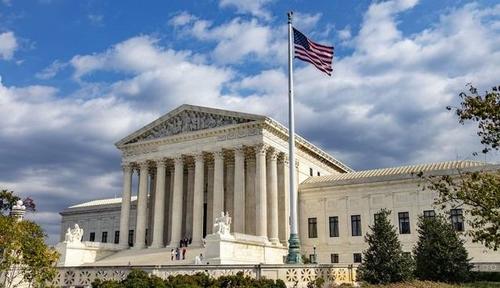
Packing the Supreme Court isn’t the only overhaul under consideration by a Biden-appointed commission studying whether Democrats should change the rules because they didn’t win.
The 36-member commission created last week is expected to meet today for a ‘private and informal’ planning session, according to the New York Times, where they will likely split into five working groups to ‘develop research for the entire body to analyze a broad scope of issues.’
Changes under discussion include:
- Term limits
- Mandatory retirement ages
- Limiting the court’s ability to strike down acts of Congress
- Requiring the court to hear more types of appeals
- Limit its ability to resolve important matters before first hearing arguments and receiving full briefings
The Friday meeting, private and unannounced, will focus on a draft road map according to the Times, citing people familiar with the commission who spoke on condition of anonymity.
Their account makes clear that the panel’s intellectual ambitions go beyond the notion of expanding the court — or “packing” it — even though nearly all of the early commentary has focused on that.
Mr. Biden decided to create the commission to defuse the thorny political question of whether to endorse adding seats to the Supreme Court. Some liberal activists have called for the step in response to Republican power plays in 2016 and 2020 that yielded a 6-to-3 conservative advantage on the court, even though Democrats won the popular vote in seven of the past eight presidential elections. Many conservatives vehemently oppose the idea. -New York Times
As the Times notes, any legislation to expand the court could be blocked by a filibuster in the Senate, while Democrats lack sufficient support within their own caucus to successfully overcome the tactic. On Thursday, House Speaker Nancy Pelosi said that she did not intend to bring up a bill introduced this week by several Democrats which would expand the court to 13 justices.
Still, Pelosi believes Court Packing should be “considered” and supports Biden’s efforts to study the issue, before noting that changing the size of the court “has been done before” and that changes in the US economy “might necessitate such a thing.”
The structure of Biden’s commission, developed by co-chairs Bob Bauer – a NYU law professor who served as an attorney in the Obama White House, and Yale law professor Cristina M. Rodríguez, a former DOJ official.
There will be five working groups as described by the Times:
The first working group, they said, would assemble materials to set the stage for the commission’s work, including information on what problems have made changing the Supreme Court a matter of recurring debate, comparisons to historical periods in which there were serious calls for changing the court and criteria for evaluating arguments about changes to the court.
The second working group would gather materials about the Supreme Court’s role in the broader constitutional system, including as a final arbiter of major issues with a legal nexus. Among what it will prepare for are proposals for Congress to strip the court of jurisdiction over certain topics, and ideas such as requiring a supermajority to strike down an act of Congress and creating a mechanism for lawmakers to override court decisions.
The third working group would put together materials about length of service and turnover of justices on the Supreme Court, including proposals to create 18-year terms that are staggered so a seat comes up every two years or to impose a mandatory retirement age on older justices. Many other countries have such a safeguard.
The fourth group would develop materials about the membership and size of the Supreme Court. In addition to looking at the history of expansions and contractions of the number of justices by Congress, it will also examine other plans for reducing partisan tensions over the issue, like creating a nonpartisan commission to recommend potential justices or transforming the court into a rotating panel drawn by lottery from the ranks of sitting appeals court judges.
The last working group would collect materials about concerns about the Supreme Court’s case selection and review powers. These include the plummeting number of cases it resolves each year compared with what it did several generations ago, and its so-called shadow docket, when the court issues emergency orders and summary decisions that resolve important questions without full briefings and arguments.
Meanwhile, the Commission will also study whether the reforms could be accomplished via congressional statute or would require a Constitutional amendment.
What happened to just playing the cards you’re dealt?
Via Zero Hedge


